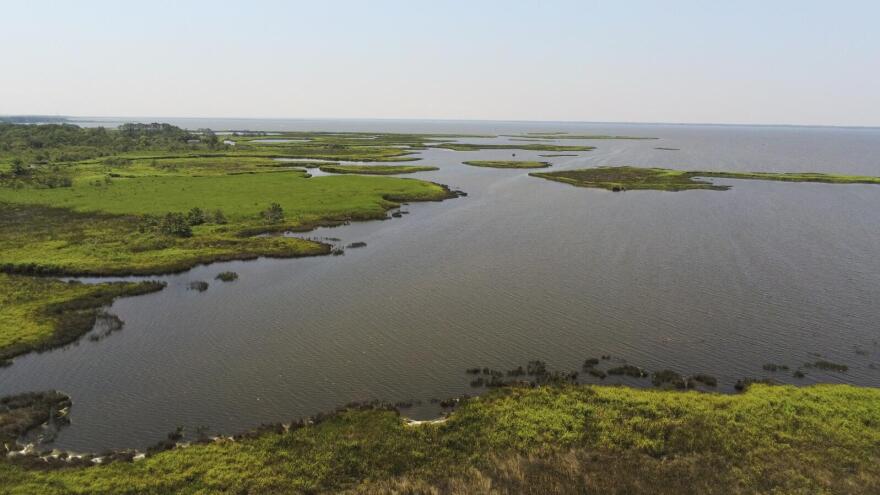The fresh-water marshes along the northern Outer Banks are an important habitat for a range of animal species. They also protect communities from erosion caused by wind and waves.
But these marshes throughout the Currituck Sound are disappearing at a rate of about 70 acres per year. Now, a new conservation plan released by the Currituck Sound Coalition lays out a pathway to not only stop the degradation, but reverse its course, allowing the marshes to serve as enhanced protection against the effects of climate change.

"It charts a course for protecting and restoring one of the most important natural resources that we have in northeastern North Carolina," says Cat Bowler, coastal resilience program manager at Audubon North Carolina, a coalition member.
Although only a few golf shots away from the ocean, the Currituck Sound is not directly connected to the Atlantic and is a oligohaline water body, meaning it has very low salt content. Because of its composition, it's an important ecosystem for birds, fish and other wildlife.
But, as seas rise and saltwater moves inland, it kills off marsh grass and other vegetation. At the same time, wind and waves drive erosion of the marsh. Experts say these destructive forces will only worsen as storms become more frequent and intense.
"The Currituck Sound is a globally rare ecosystem. It's an incredibly important place for birds — from wintering waterfowl to secretive marsh birds," Bowler says. "And for people; for all of the different ecosystem benefits that marshes provide — whether it's enhancing water quality, or buffering communities and infrastructure from erosion.

"But some of those same things that make the sound unique — the fact that it's a freshwater ecosystem, it's a fairly shallow system — those things also make it very vulnerable to rising seas, to saltwater intrusion, and to the erosion that comes along with those processes."
The plan lays out five strategies to protect the Currituck Sound and its marshes. The first strategy highlights inland areas that can become marshes, so that instead of simply disappearing, the existing marshes can move.
"They're a really interesting habitat type because they can adapt to sea level rise if they're given the space and time to do so," Bowler says. "So we know that if we protect open areas upslope from marshes that, over time, they will actually migrate into those areas, so long as there aren't barriers to that process. And so all is not lost. There are opportunities for us to help these marshes adapt to sea level rise over time."

Some groups have already started pilot projects to revive degraded marshes, like using living shorelines to mitigate erosion and applying thin layers of sediment to the marsh surface to help it keep pace with sea level rise over time. But members of the coalition say more will need to be done.
"The Marsh Conservation Plan benefits the overall health and resilience of coastal marsh wetlands and habitats of Currituck Sound," says Rebecca Ellin, program manager of North Carolina Coastal Reserve and National Estuarine Research Reserve. "Understanding where and how this critical habitat is vulnerable, and developing a collaborative proactive approach to managing these resources, this plan and future practices will help counteract some of these vulnerabilities, ultimately resulting in a stronger more sustainable environment in the Currituck Banks Reserve and throughout the Currituck Sound."
Copyright 2021 North Carolina Public Radio


